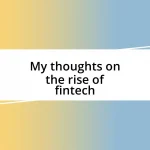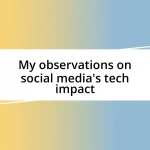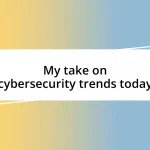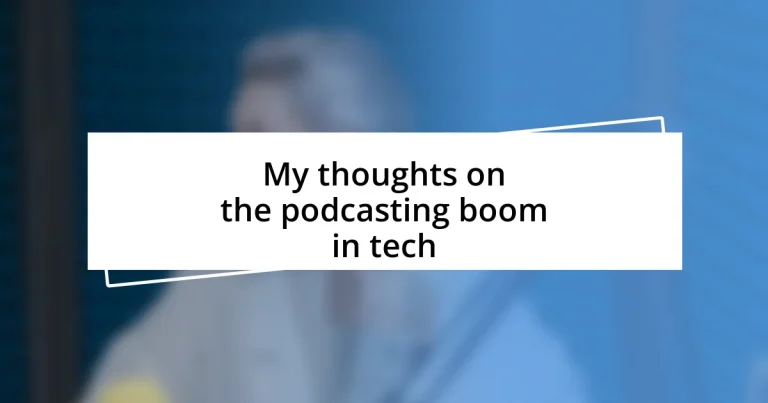Key takeaways:
- The podcasting boom has democratized content creation, allowing diverse voices to share insights and experiences, enriching the listening experience.
- Technological advancements in recording, editing, and streaming have made it easier for creators to produce high-quality podcasts, enhancing audience engagement.
- Future predictions suggest that AI will personalize content, premium podcasts will grow, and educational institutions will increasingly integrate podcasts into learning environments.
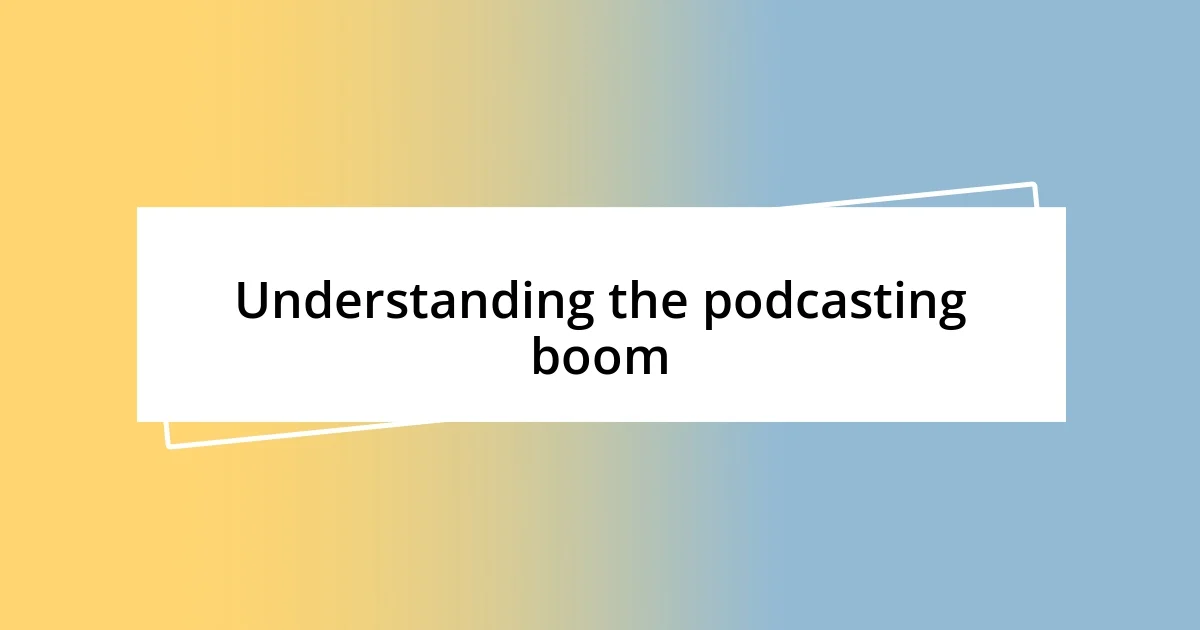
Understanding the podcasting boom
The podcasting boom has transformed the way we consume information and connect with each other, especially in the tech world. I remember the first time I tuned into a tech podcast; it was like having a roundtable discussion with experts right in my ear. It made complex topics feel accessible and personal, sparking my curiosity like nothing else.
Why are people flocking to podcasts? For me, it’s about the freedom and flexibility they offer. I can listen while cooking dinner or commuting to work, making learning a seamless part of my day. This on-demand nature allows tech enthusiasts to engage with topics at their own pace, fostering a sense of community among listeners.
As the podcasting landscape expands, there’s a notable shift towards niche content. I’ve noticed that more creators are diving deep into specific areas of technology, capturing the interests of dedicated audiences. This specialization not only enhances the listening experience but also empowers listeners to explore their passions in ways traditional media rarely does.
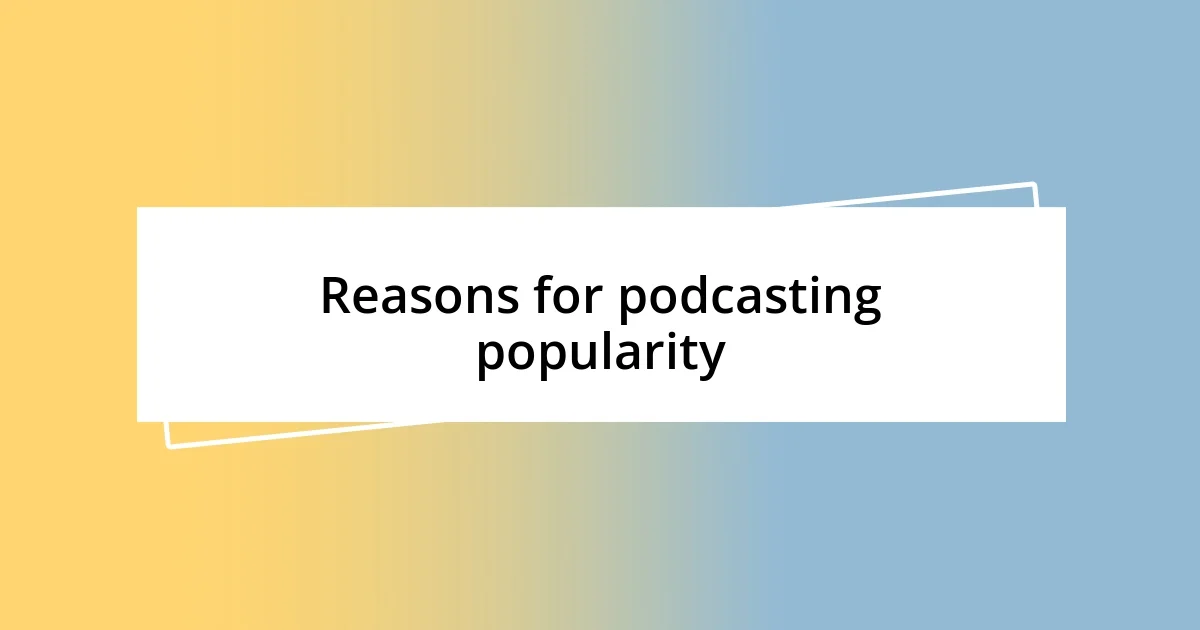
Reasons for podcasting popularity
Podcasting has become increasingly popular for several compelling reasons. One significant factor is the democratization of content creation. I’ve always found it fascinating how anyone with a microphone and passion can share their voice. This openness invites a diversity of perspectives, making the medium rich and varied. As a listener, I appreciate discovering unique voices that might not have a platform elsewhere.
Another reason for the surge in podcast popularity is the ability to create a personal connection. When I listen to my favorite tech podcasts, I often feel like I’m sitting in the room with the hosts. Their stories, interviews, and banter foster a sense of intimacy that draws me in. This personal touch makes the content more relatable and engaging, setting podcasts apart from traditional media formats that can feel distant.
Lastly, the educational value that podcasts deliver cannot be overlooked. I remember coming across a tech podcast that broke down complex topics into digestible insights. Such episodes spark my interest and encourage me to delve deeper into subjects that initially seemed intimidating. This ease of access to information is particularly appealing in a fast-paced industry like tech, where staying updated is crucial.
| Reasons for Popularity | Description |
|---|---|
| Democratization of Content | Anyone can share their voice, leading to diverse perspectives. |
| Personal Connection | Intimate storytelling creates an engaging listener experience. |
| Educational Value | Complex topics are made accessible, fostering deeper understanding. |
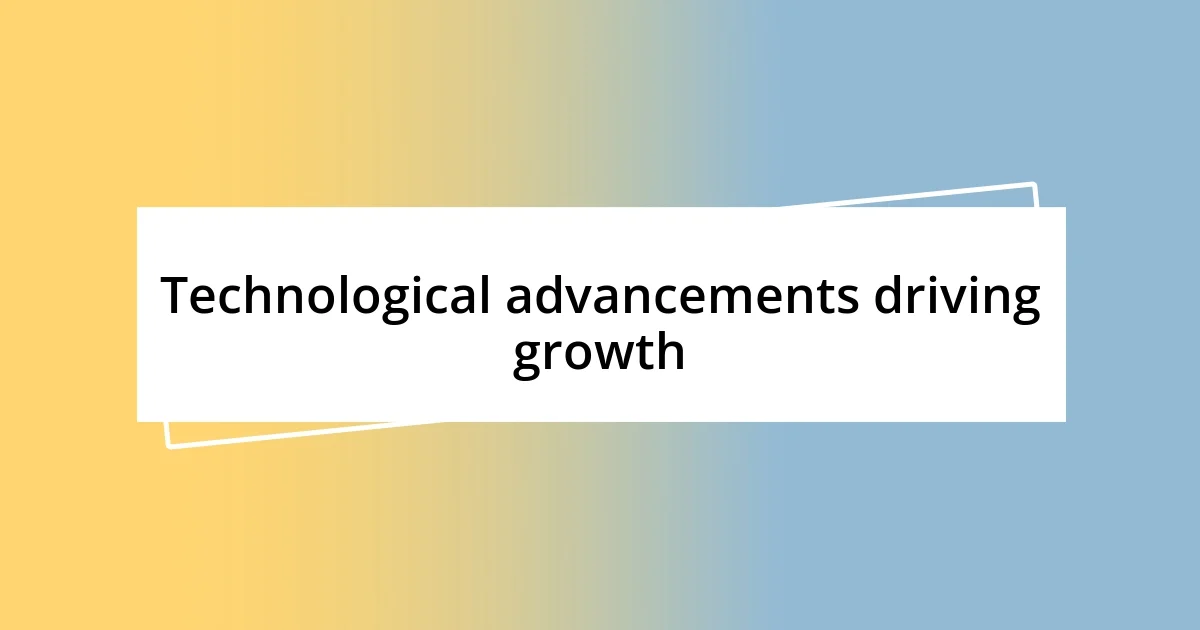
Technological advancements driving growth
As I reflect on the technological advancements that have fueled the podcasting boom, I can’t help but recognize how tools like high-quality recording equipment and user-friendly editing software have made it easier for creators to produce professional-sounding content. I still remember the days when I experimented with basic recording apps on my phone, marveling at how far the technology has come. It’s empowering to see how platforms like these allow budding podcasters to refine their craft and share their insights with a global audience.
- Recording Equipment: Improved microphones and audio interfaces enhance sound quality, making podcasts more enjoyable to listen to.
- Editing Software: User-friendly programs have streamlined the editing process, allowing for polished episodes even if the creators are novices.
- Hosting Platforms: The rise of podcast hosting services has simplified distribution, letting creators reach their audience effortlessly.
- Streaming Technology: Enhanced streaming capabilities ensure seamless playback across devices, inviting more listeners to join the conversation.
Looking at the rise of live broadcasting features, I’ve felt the excitement of being part of real-time discussions. It’s like a virtual gathering, where listeners can chime in and ask questions. There’s a palpable energy that comes from knowing you’re connected with other fans who share your enthusiasm. This interaction enriches the experience, transforming passive listening into an engaging conversation that tech enthusiasts crave.

Impact on tech industry trends
The podcasting boom is undeniably shaping tech industry trends in fascinating ways. For instance, I recently started noticing how many tech companies are now leveraging podcasts as part of their branding strategy. I can’t help but think back to when promotional material was limited to written content or visuals. Now, brands are weaving their narratives and building communities through voice, enriching their connection with audiences.
Moreover, we’ve seen a rise in niche podcasting within the tech sector. I recall stumbling upon a podcast solely focused on sustainable technology, and it sparked a newfound passion for green innovations. This specialization fosters deeper conversations around innovations that might have otherwise flown under the radar. It makes me wonder: how many ground-breaking ideas are waiting to gain traction simply because they are being discussed in these intimate yet far-reaching spaces?
The dynamics of consumer engagement have shifted dramatically as a result of this podcasting surge. I vividly remember tuning in to a live podcast episode and participating in a Q&A session. It was exhilarating to engage directly with hosts and industry experts in real-time. This interactivity transcends traditional media, creating a unique ecosystem where listener feedback can directly influence future content. It leaves me pondering the potential for even greater collaborative discussions as more voices enter the podcasting arena.
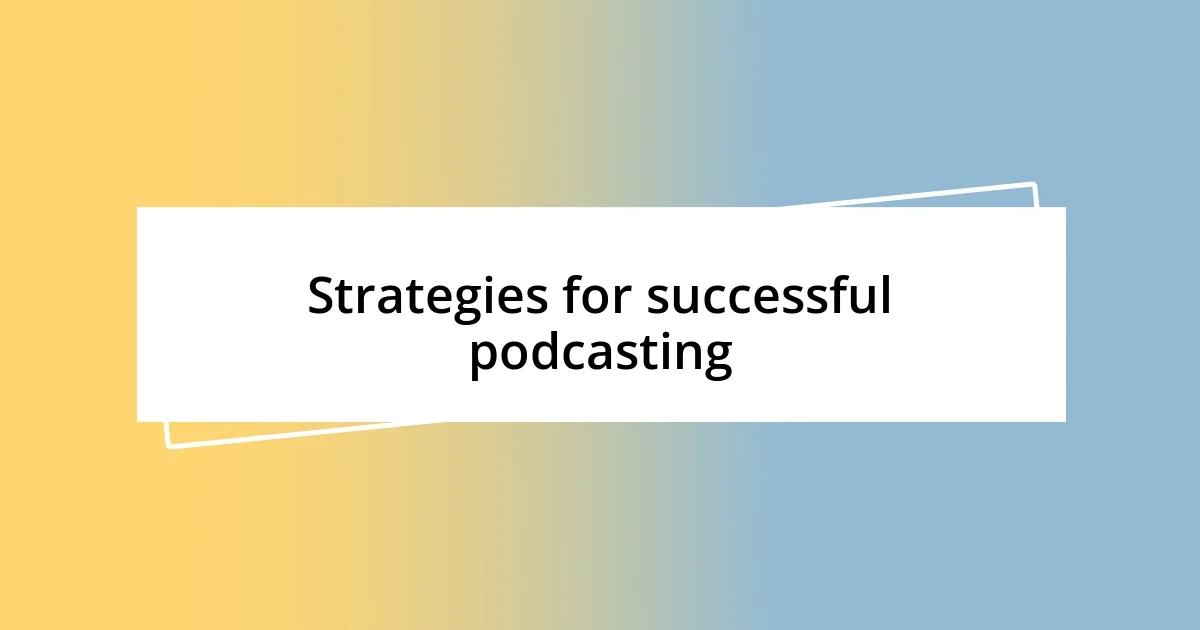
Strategies for successful podcasting
When I think about successful podcasting strategies, one stands out: knowing your audience. It’s easy to overlook this, but understanding who you’re speaking to shapes everything from your content to your style. I remember launching my first podcast episode without a clear target in mind, and it felt like shouting into a void. But when I began tailoring my topics to meet the interests of my listeners, the engagement skyrocketed.
Another key strategy is consistency. It may sound simple, yet it’s crucial for building a loyal audience. I’ve learned the hard way that sporadic releases can frustrate listeners. When I committed to a regular publishing schedule, I noticed a shift in my listeners’ response—they started to look forward to my episodes. It became less about me and more about creating that shared anticipation within the community.
Lastly, don’t underestimate the power of storytelling. I often reflect on how impactful a well-told story can be in resonating with listeners. I recall an episode where I shared a personal failure and the lessons learned from it. The feedback was overwhelming. Suddenly, my audience didn’t just see me as a speaker; they connected with me as a person. That connection is invaluable and often leads to more engaged discussions and a deeper sense of community among listeners. How do you weave your story into your podcast? The more authentic your narrative, the more likely it is to inspire others.

Future predictions for podcasting
As I look ahead, I can’t shake the feeling that podcasting will soon become an essential part of the tech landscape. I’ve noticed how emerging technologies, like artificial intelligence, are starting to influence podcast production, making it easier to create personalized content. Imagine a future where AI curates episodes based on individual listener preferences or even generates tailored segments. How fascinating would it be to have a podcast that feels uniquely crafted for you?
Moreover, I believe we’ll see an expansion in platforms hosting exclusive and premium podcast content. Recently, I encountered a subscription-based podcast that offered invaluable insights not available elsewhere, and it made me think—people are ready to invest in quality. It excites me to envision a world where creators can monetize their content more effectively, leading to higher production values and even more compelling stories. What kind of transformational narratives could emerge from this shift?
Lastly, I predict that the integration of podcasts into educational systems will grow. Reflecting on my own experiences, I remember how engaging learning became when I could listen to expert discussions while commuting. This fusion of education and entertainment could revolutionize the way we absorb information. Will we soon see students devouring course materials through podcasts, bridging gaps in traditional learning? The possibilities are endless, and I can’t wait to see how this all unfolds.
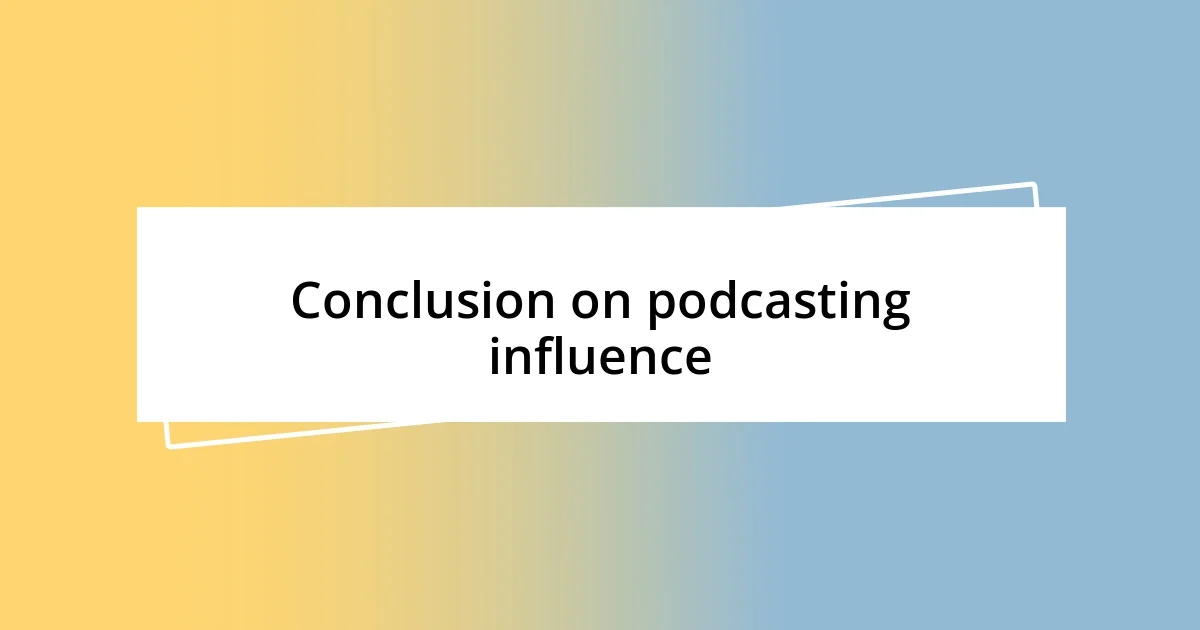
Conclusion on podcasting influence
As I reflect on the influence of podcasting, it’s striking how this medium has democratized knowledge sharing. I remember when I stumbled upon a niche podcast that delved deep into a subject I was passionate about—suddenly, I found a community of like-minded individuals. This experience made me realize that podcasting isn’t just about broadcasting ideas; it’s about cultivating connections and fostering discussions that often go unheard in traditional media.
The impact of podcasting also extends to the way we approach technology discussions. I often think back to an industry event where I learned more from informal podcast conversations than from the formal presentations. These personal stories and insights shared by experts weren’t just fascinating; they were transformative for my understanding of tech trends. How often do we get to hear the human side of innovation? This narrative-driven approach not only enriches our perspectives but also encourages a diverse range of voices to be heard.
Ultimately, the influence of podcasting is undeniable. It shapes not just what we talk about but how we connect with one another as a society. Reflecting on my own journey, I see how this platform has empowered me to share my experiences and learn from others. Isn’t it incredible to think about the new conversations and ideas that can emerge from a simple podcast episode? As we continue to navigate this evolving landscape, I genuinely believe we’re just scratching the surface of podcasting’s potential impact on our lives.








